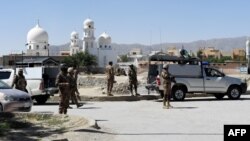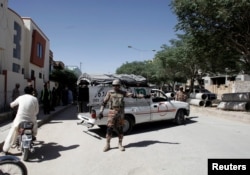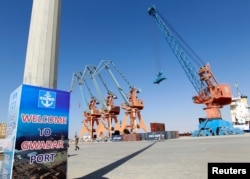Religious rights activists are questioning Chinese authorities’ handling of the aftermath of two missionaries from China, who were recently abducted and killed by the Islamic State (IS) group in Pakistan.
Instead of consoling the family and friends of the pair, activists said the Chinese government is using the tragedy as an excuse to suppress family churches and Christians in Wenzhou, a port city in China’s eastern province of Zhejiang.
Jonathan Liu, a priest with the San Francisco-based Chinese Christian Fellowship of Righteousness, said police in Wenzhou have detained four church leaders who had assigned the pair to go to Pakistan.
“They [China] should have had held the murderer [IS] responsible, but, instead, they have [now] arrested the victims’ family members, friends and fellow workers from their churches,” Liu said, citing updates from a Wenzhou priest.
Other missionaries missing
China claims a South Korean missionary organization recruited the two to preach in war-torn areas, but activists tell VOA that the pair were college-educated and devoted Christians who voluntarily went to Pakistan on assignment from their own churches. The assignment was arranged in collaboration with the South Korean missionary group.
“After the killing of these two preachers, 11 Chinese nationals who had worked with the pair have returned back to China, but their whereabouts remain unknown. And no lawyers have been allowed to visit them. I find it appalling,” Liu added.
The two Chinese missionaries Li Xinheng, 24 and Meng Lisi, 26, were abducted by the IS group in Quetta last month, the capital of Pakistan’s impoverished Baluchistan province. IS later claimed responsibility for their deaths on June 8.
The Pakistani Interior Ministry said that the Chinese pair had travelled to Quetta in November of 2016 “under the garb [guise] of learning [the] Urdu language from a Korean national” but were “actually engaged in preaching.”
Blame game
The Korean national and 11 other Chinese nationals from his Urdu-language school were later ordered to leave Pakistan after their business visas were revoked and they were accused of involvement in “illegal preaching activities.”
Chinese state media have put the brunt of the blame on South Korean missionary organizations.
The Global Times said the South Korean group “recruits young people in China” and “sends naïve teenagers to conduct missionary activities in Muslim countries… Some Chinese voluntarily join in the dangerous missionary activities in countries like Pakistan, Afghanistan and Iraq after being converted by South Koreans.”
Mixed reaction
Such characterization immediately drew mixed reaction online while some observers say the authorities’ twist was meant to “mislead the Chinese people.”
On Weibo, China’s Twitter-like microblogging platform, some users threw their support behind the state media’s accusations.
“For those who don’t cherish their own lives, I have nothing to say to you but: you deserve it [to die]. Sorry, our consolation doesn’t come cheap,” wrote one Weibo user.
Others, however, disagreed.
“[This is] so strange that many hurry to slam South Korea, Christians and missionaries. Yet few blame the IS killer?” asked a user named Shen Dafei.
“This is evil when you show no respect for the lives of others and do nothing but find fault with the victims,” another user wrote.
Rights lawyer Ge Yongxi said he believed both Chinese and South Korea missionaries working in Pakistan have broken no laws, neither does China have a legal footing to detain local church members associated with the pair.
“Everyone has the right to freedom of opinion and expression. He, who is a religious follower, can certainly freely share his religious belief and doctrines — rights clearly enshrined in the article 19 of the Universal Declaration of Human Rights,” which all United Nations members, including China and Pakistan, should honor, Ge said.
Liu, the California-based priest, said the Communist government’s stance on the tragedy shows its true colors.
“In the minds of Chinese Communists, people are viewed and treated like dirt. All they care is to follow through their Belt and Road plan [linking neighboring countries] in order to tighten its grip of power,” Liu said.
Iron brothers
In an editorial, the Global Times insisted the “IS killing won’t impact China-Pakistan ‘iron brother’ ties.
The atrocity committed by the IS is “appalling,” it wrote, “But it cannot drive a wedge between China and Pakistan, nor will the construction of the CPEC [China-Pakistan Economic Corridor] be disrupted.”
China has pledged to invest more than $50 billion in Pakistan in projects linked to its Belt and Road Initiatives, although its concerns over the country’s security are running high in the wake of the tragedy.
Following the security lapse, Pakistan is said to have dispatched some 15,000 military personnel to protect Chinese engineers working for the economic cooperation project in the country.







